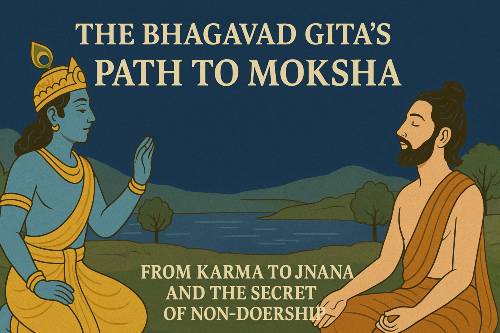Hindu Philosophy, among the world’s oldest and most intricate philosophical systems, offers a deeply spiritual and intellectual exploration of existence, consciousness, and the ultimate truth. With roots embedded in the ancient scriptures—the Upanishads, Bhagwad Geeta, and Vedas—it provides a timeless framework for understanding the Nature of Reality, human purpose, and liberation (Moksha).
Table of Contents
Hindu Philosophy, among the world’s oldest and most intricate philosophical systems, offers a deeply spiritual and intellectual exploration of existence, consciousness, and the ultimate truth. With roots embedded in the ancient scriptures—the Upanishads, Bhagwad Geeta, and Vedas—it provides a timeless framework for understanding the Nature of Reality, human purpose, and liberation (Moksha).
Over millennia, Hindu Philosophy has evolved into several schools of thought. Among these, Advaita Vedanta—propounded by Shri Adi Guru Shankracharya—stands as one of the most intellectually rigorous and spiritually elevating paths. It promotes the idea of non-duality, asserting that the individual self (Atman) and the universal consciousness (Brahman) are not two separate entities but are one and the same.
The Foundations: Vedas, Upanishads, and the Bhagwad Geeta
To understand Advaita Vedanta, one must first dive into the foundational texts of Hindu Philosophy. The Upanishads, also known as Vedanta (the end or culmination of the Vedas), are a collection of spiritual discourses that explore metaphysical questions such as: Who am I? What is consciousness? What is the ultimate reality?
A discussion on Upanishads reveals a recurring theme—Brahman, the infinite, unchanging reality that underlies the phenomenal world. This is not a theoretical abstraction but a living truth to be realized through direct inner experience.
The Bhagwad Geeta, a sacred dialogue between Lord Krishna and the warrior prince Arjuna, presents a more pragmatic approach. It explores the paths of Gyan Yog (knowledge), Karm Yog (selfless action), and Bhakti Yog (devotion) as means to reach the same ultimate goal—liberation from the cycle of birth and death.
A meaningful discussion on Bhagwad Geeta illuminates the psychological and ethical dimensions of Hindu Philosophy, making it deeply relevant for modern seekers navigating complex moral landscapes.
Advaita Vedanta: The Crown Jewel of Hindu Thought
Advaita Vedanta, meaning “non-dual end of the Vedas,” was systematized by Shri Adi Guru Shankracharya in the 8th century CE. His teachings argue that there is no fundamental separation between the self and the absolute. The world of multiplicity, difference, and form is ultimately an illusion (Maya), veiling the singular truth of Brahman.
A deeper discussion on Vedanta, especially Advaita Vedanta, challenges our conventional views of self and world. According to this tradition, all suffering arises from ignorance (Avidya) of our true nature. Liberation (Moksha) is attained not through external rituals but through advaita vedanta learning, advaita vedanta understanding, and eventually, realization.
The Advaita Vedanta teaching process often includes:
-
Shravana (listening to the scriptures)
-
Manana (reflecting deeply)
-
Nididhyasana (deep meditative absorption)
This inward journey is not merely spiritual rhetoric—it is transformative. Modern spiritual seekers increasingly turn to advaita vedanta courses and articles on advaita vedanta for guidance in transcending the ego and realizing oneness.
Quantum Physics and Advaita: Bridging Science and Spirituality
Interestingly, many scholars and scientists today are discovering profound parallels between Advaita Vedanta and Quantum Physics. The quantum world defies the classical notions of separateness and objectivity. Particles exist in states of potentiality, interconnected across vast distances—echoing the Advaita idea of one indivisible whole beneath the appearance of multiplicity.
While Quantum Physics explores the external cosmos, Advaita Vedanta explores the internal consciousness. Both arrive at a startlingly similar conclusion: reality is not what it seems.
This convergence has sparked interdisciplinary dialogues around consciousness, the observer effect, and the Nature of Reality. Many now believe that insights from Hindu Philosophy could illuminate unanswered questions in modern science, especially regarding the mind and matter relationship.
The Yogic Paths: Karma, Bhakti, and Jnana
The beauty of Hindu Philosophy lies in its inclusiveness. While Advaita Vedanta may appeal to intellectual seekers, others may resonate more with the devotional or action-oriented paths.
-
Gyan Yog is the path of knowledge and discrimination, closely aligned with Advaita Vedanta.
-
Karm Yog emphasizes selfless action, as elaborated in the Bhagwad Geeta.
-
Bhakti Yog is the path of love and devotion toward a personal deity.
Each of these paths caters to different temperaments but ultimately leads to the same destination—realization of the Self.
Learning and Living Vedanta in the Modern World
In today’s fast-paced world filled with stress, anxiety, and existential dilemmas, the teachings of Hindu Philosophy are not just ancient artifacts—they are essential life tools. Institutions and sacred spaces are emerging worldwide to make this wisdom accessible and applicable.
One such sanctuary is Brahmasmi.world, a sacred space for collective wisdom. Here, seekers can find expertly curated advaita vedanta courses, participate in satsangs, and engage in deep contemplation. The platform serves as a bridge between ancient teachings and contemporary lives, helping individuals uncover clarity, peace, and purpose.
Whether you’re just beginning your journey or are already deep in advaita vedanta understanding, Brahmasmi.world offers a unique spiritual ecosystem that supports authentic self-realization.
Why Hindu Philosophy Matters Today
In a world fragmented by identity, division, and superficiality, Hindu Philosophy invites us to return to the center—to the Self. It doesn’t ask you to believe; it challenges you to inquire. It doesn’t offer salvation through blind faith but through self-knowledge and conscious living.
A true discussion on Vedanta is not a mere intellectual exercise—it’s a revolution of perspective. Through Gyan Yog, one uncovers the knowledge of Brahman; through Karm Yog, one learns to act without attachment; and through Bhakti Yog, one surrenders in divine love. These are not mutually exclusive; they are complementary paths to a liberated life.
Final Thoughts
Hindu Philosophy is a timeless invitation to awaken. The Upanishads, Bhagwad Geeta, and the teachings of Shri Adi Guru Shankracharya offer a roadmap not just for mystical insight, but for living a purposeful and compassionate life.
As science and spirituality begin to converge—especially in light of Quantum Physics—more people are drawn to Advaita Vedanta to seek answers to the big questions: Who am I? Why am I here? What is real?
And for those earnest in their quest, platforms like Brahmasmi.world stand as beacons of light—guiding modern minds through ancient wisdom.





More Stories
How Do You Choose Between 6-Hour and 12-Hour French Tutoring?
What Is a Youth Opportunity Center? Programs, Benefits, and How They Empower Young People
Top 7 Ways to Learn French Online from Home in Paris